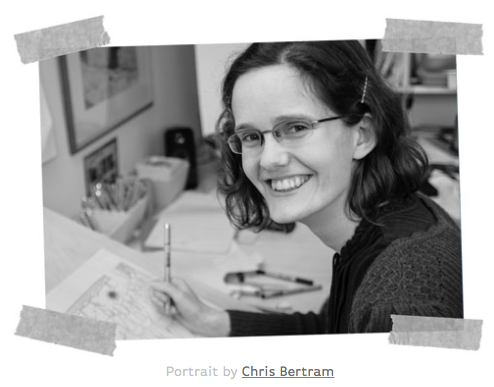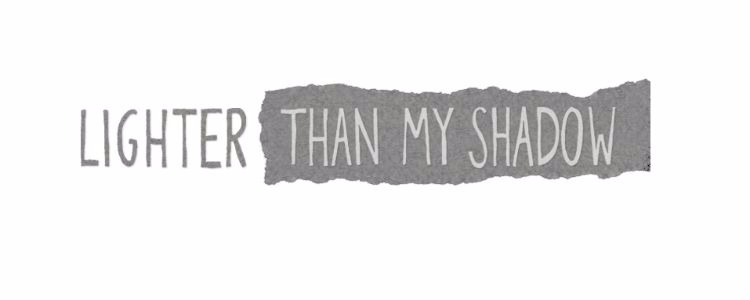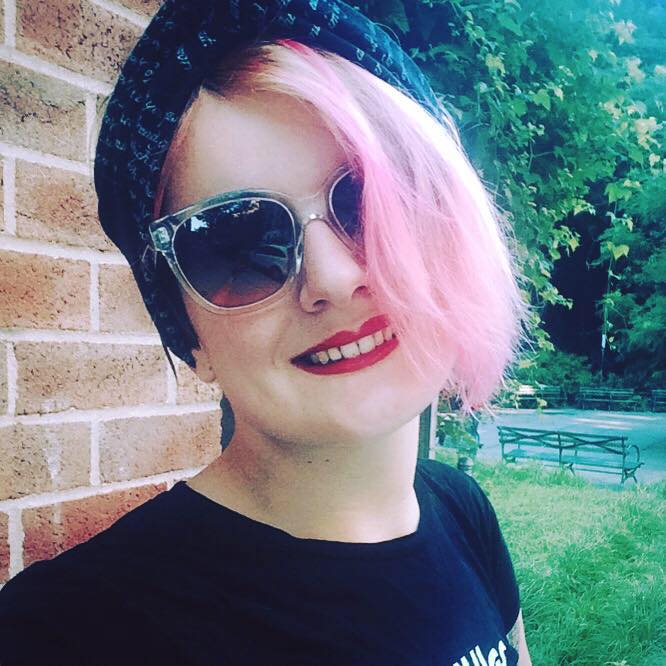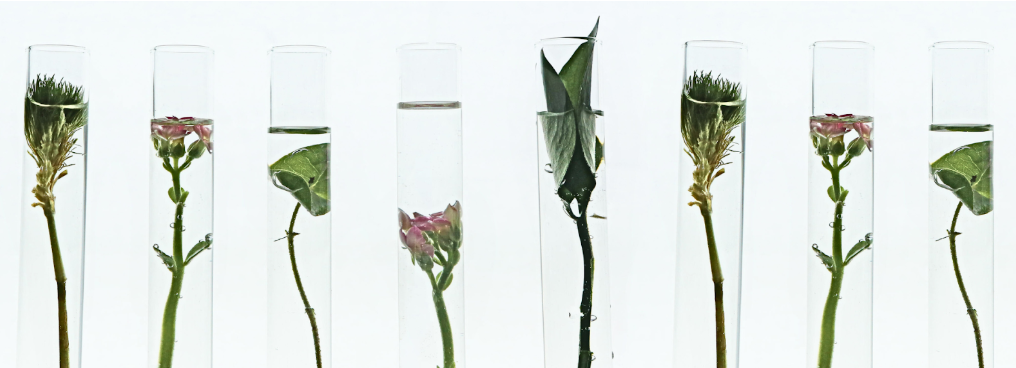Katie Green’s book, Lighter Than My Shadow, is a graphic memoir unlike any other. It tells the story of her battle with eating disorders, abuse, and recovery in an extremely compelling manner. The striking contrast between Katie’s “cutesy” art work, raw images, and taboo topics makes for an honest portrayal of the darkness we battle in recovery, but there is a balanced sense of hope. We had the chance to sit down with Katie to discuss her work, how art was an outlet in recovery for her and what drove her to share her story through this platform.
Diana Denza: Can you tell us a little more about yourself and when did you start writing, illustrating, and crafting?
Katie Green: That’s a good question actually, because I don’t really know. It was part of my recovery. I was studying biology, and I was really unhappy and struggling with myself, so I went back to creating as a way of expressing how I was feeling. So, I guess I was about 17 or 18? I mean, I had always been creative when I was a kid, and I stopped doing it because people told me that being creative was not a suitable career path. So, I had always been creative when I was a kid but I would stop and start again, so it’s hard to pick a point when it began. It was more of a coming back to something I had always done.
DD: A lot of people in recovery do tend to create art or write, and they’ve said to us before that it helps them in their recovery process. In what ways did it help you in your recovery?
KG: It was very specific to the book, actually. I had this idea that I wanted…this was a book that I wished had existed, and I couldn’t find it so I decided to write it, and that became my reason for getting better. I could only write this book if I was better. So that became my thing and my focus that I was working towards. It kind of kept me going.
DD: Yeah, that’s awesome to hear! It sounds like this was a really important thing for you to engage in in terms of your own recovery. You mentioned that you couldn’t find anything like this. Do you find the media’s representation of eating disorders to be problematic?
KG: Yes (laughing) yes, I do.
DD: And what kind of messages were you seeing, personally?
KG: I think the main thing I wanted to express to people about what I couldn’t find in other books, was something that reflected really how long it takes and how hard it is, but is also still hopeful. Everything that I found was kind of empathetic about how hard it is was, saying, “You’re going to be stuck with this for the rest of your life.” That was just really depressing to me, so I wanted something that kind of balanced that reality with being hopeful and that it could get better.
DD: Absolutely. In terms of the process of creating your book, what was the most challenging part?
KG: It was definitely the scenes that deal with sexual abuse, because just in terms of time scale it was more recent than my anorexia, so it was still kind of raw and difficult to talk about. And, when I was working on those pages, I couldn’t bear to look at what I had drawn so I was covering them up with bits of paper and would just work on tiny panels a bit at a time. I couldn’t have the whole page in front of me. That was not fun.
DD: I think that people commonly have this misconception that comics deal with lighter issues. What’s it like to have created this book and show people that comics can deal with really heavy topics like sexual abuse and eating disorders?
KG: I think people respond to it really well. I think there’s something about the presentation of it as a comic that makes it easier to pick up, makes it easier to read. I think particularly because people think my drawing style is really cute. I think if my drawing style was dark and somber, it might not be as appealing. But, you pick it up and you think, “Oh look, it’s this cute little smiley-faced girl,” and somehow people identify and respond to it really well.
DD: Was that cutesy style a conscious choice or is that how you draw personally?
KG: It’s just how I draw. I spent three years at art college for them to get me to not draw like that, and I just can’t help it.
DD: What did you learn about yourself during the process?
KG: I learned that the thought patterns that gave me an eating disorder are still there in a different kind of context. I had really thought that recovery was something that I was finished with and I was going to write the book and writing the book really challenged me in revisiting some of those thoughts and behaviors and, you know, facing them again. Not in a way that I was still struggling with it, but it made me realize that it is still a part of who I am, if that makes sense.
DD: It does make sense. It does make sense and a lot of people who have struggled with an eating disorder or are in recovery realize that they are struggling in other ways.
KG: It just made me really aware, like, “Oh, I’m approaching that like it’s an eating disorder.” It was just interesting to have gained enough distance from it to observe that in myself.
DD: And when you see those behaviors coming up, what do you do? How do you manage those types of behaviors as you see them come up?
KG: I slow down. I talk to my therapist about it, I talk to my partner about it. I make sure that it’s not a secret because I think that’s one of the most dangerous things, when you keep it to yourself. Making sure that people know I’m struggling, people who are close to me.
DD: Having that support is really important for a lot of people in recovery. Now that you are here at this big book expo and you are promoting your graphic novel, what are some things you like to do to take care of yourself and make sure you’re treating yourself well?
KG: I eat (laughs). Eating well helps. I’m quick to observe what happens to my brain if I don’t eat, especially for things like this when I might feel anxious or overwhelmed, excited, or busy. It’s so easy to get out of a routine but I just try to keep a routine of eating, sleeping enough, relaxing. I do knitting, it’s a really helpful activity for me, and drawing, obviously. Yeah, just doing the important things.
DD: It sounds like you have a lot of different things that are very comforting for you.
KG: Yeah, I’m lucky.
DD: In terms of other people in recovery, how do you hope your graphic novel will inspire them or help them?
KG: I just hope it reaches people who feel like they’re going through it on their own. I really want to reach out to people and let them know that these weird things that they’ve thought or they find themselves doing, they’re not the first person, and they’re not the only person. I don’t think I ever intended for it to be a book that presents a solution…just maybe a bit of companionship. Just something for them to feel like they’re not on their own.
DD: When you were struggling, how did you wind up getting help for yourself and recognizing that you had an issue?
KG: I avoided it for a long time, as I think other people do too. I was taken to A&E, the emergency room, that’s what we call it. They were going to admit me as an inpatient, and that’s when I started to realize that this wasn’t what I intended to be going on. Our healthcare system is quite different in the UK, so I was 17, still technically a child, and my care wasn’t negotiable. It was like, “This is what we’re going to do because you’re a child.” I didn’t have to ask for it as it was just given and I was very lucky.
DD: At that time, who were the people who supported you?
KG: My parents. My parents were incredible, and I think it’s a tricky thing because the way they’re portrayed in the book, they don’t always come across in the best way. But, what they gave me was so amazing. I was not only admitted to the hospital, but I was taken out of school. I was out of school for six months and they didn’t want me to be alone at the risk of self-harm. They took alternate days off of work to look after me and make sure I wasn’t making myself sick. They were just there every day, but they struggled. They didn’t understand, they didn’t say the right things, but they were there. That was really special.
DD: We hear a lot of the times that parents can play a really important role in recovery. Is there any advice that you have today for parents who might be taking care of a child who is in recovery?
KG: Encourage them to remember that what their child is going through is an illness. And the kind of aggressive and horrible things they may say, they don’t mean. It comes from the illness and not the child because they can say some really hateful, horrible things. I don’t think there’s anything more I could have wanted my parents to do, to be honest. They were amazing.
DD: It sounds like they were so important for you and that’s so great to hear.
KG: I couldn’t have done it without them. Actually, you’re making me think I should probably tell them that (laughing).
DD: I’m sure that they would love to hear it. How do you feel about this book getting so much press attention, because it is so personal?
KG: It’s quite weird because I never really thought about this side of things. If I had thought it out, I probably wouldn’t have done it. But, I did the book because I felt like I needed to. I needed it to exist. When I talk about the book, quite often I’ll say, “well, I wrote the book because I didn’t want to talk about it. I didn’t want to have to explain it.” It’s weird to find myself in a situation where it has become my identity, again, and I did so much work in therapy for it to not be my identity. So it is a bit of a weird paradox situation.
DD: It sounds like you were in control this time, though.
KG: Most of the time, yeah (laughs). It’s amazing, the book is being received and read by the people, so it is really great.
DD: For your next books and pieces, do you have anything in mind about what you might write about? Will it be something like another memoir, a piece about yourself?
KG: I’m not quite ready to talk about the next piece yet. I do have something in mind. It will be nonfiction, but less personal. I don’t think I have anything more to give.
DD: Who were some of your inspirations, both personally and professionally?
KG: In terms of comics, the first comic I ever read was Blankets, which is such a great book. I also really love Shaun Tan, who is an Australian children’s illustrator, but his books are definitely for all ages. I picked up his book The Red Tree in a children’s bookshop when I was studying biology and that was the book that made me think “I need to write my book. I need to be an illustrator. I need to tell my story in this way.” That was really a pivotal book for me, and I recommend it. It’s kind of about depression, so it’s very relevant and beautiful.
DD: What tips would you have for people who share their story? Maybe not in the form of a graphic novel, but maybe as a blog post or something like that. What tips would you have for people who want to open up about their own experiences?
KG: Just do it. It’s so refreshing and rewarding, and you connect with some of the most incredible people. I’ve had very few unpleasant responses to my book, but the overwhelming majority of people have opened up to me and shared something personal. It’s just the most amazing way to make connections and to be therapeutic would recommend it in any way that feels appropriate.
DD: Is there a piece of feedback that has been especially moving or inspiring for you?
KG: I particularly enjoy hearing from parents, which surprised me. I’ve had parents write to me to say that it helped them understand what their son or daughter was going through. That is really special to me.
DD: It is so important that they’re reading this. Parents and educators are really the ones who can create change in children’s lives. Finally, is there anything else we should know? Any upcoming tours or works in progress? I know you have something big under wraps, but anything else that we should keep an eye out for?
KG: Nothing in particular. The book took me the best part of five years to do it, and it’s taken me the best part of five years to recover from doing it. So, to prepare myself for doing another one is going to take time, I think. I’m just resting, recovering, and trying not to put pressure on myself, (laughing) which is new to me!
DD: Well, is there something fun that you have planned for yourself that you’re looking forward to?
KG: I’m going home to spend some time with my dog.
DD: That sounds like a lot of fun.

Portrait by Chris Bertram
To learn more about Katie and her work, visit lighterthanmyshadow.com. Lighter Than My Shadow is currently available in the UK and will be released in the US in October 2017.
Content Warning: If you are struggling with an eating disorder or abuse, please know that the content and images of this graphic novel can be triggering. If you are in recovery, check with your doctor before reading this book.
For recovery resources and treatment options, please visit our help and support page. If you or someone you know is struggling with an eating disorder, call ANAD’s Helpline at: (888) 375-7767 or the National Alliance of Eating Disorders Helpline at: (866) 662-1235.
If you are thinking about suicide, call or text the National Suicide Prevention Lifeline at 988. In crisis situations, text “NEDA” to 741741 to be connected with a trained volunteer from the Crisis Text Line.






